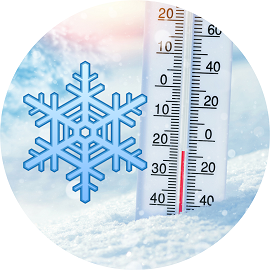 Winter storms create a higher risk of accidents, hypothermia, frostbite, carbon monoxide poisoning, and heart attacks from overexertion. FEMA and the Red Cross recommend that you
Winter storms create a higher risk of accidents, hypothermia, frostbite, carbon monoxide poisoning, and heart attacks from overexertion. FEMA and the Red Cross recommend that you
Prepare:
Make Sure Your animals are Taken Care Of: Have food and water available along and a warm place for them to shelter.
Keep Pipes Warm: Frozen pipes are one of the most common problems caused by winter weather. To keep pipes running, let your faucets drip when temperatures start to drop near or below freezing.
Prepare a DIY Emergency Kit: Pack any essentials you and your family would need if you were to lose power or be snowed in. This can include things like a first aid kit, flashlight, batteries, hand crank radio, car chargers, hand warmers, hand sanitizer, medications, bottled water and non-perishable food.
Check Smoke & Carbon Monoxide Detectors: Fireplaces and common household appliances such as dryers and furnaces, can produce carbon monoxide. Test your smoke detectors regularly and install carbon monoxide detectors that will alert you if there are unsafe gas levels in your home.
During the Winter Storm Event:
- Avoid travel if possible.
- Limit your time outside. If you need to go outside, wear layers of warm clothing.
- Watch for signs of frostbite and hypothermia.
- Avoid carbon monoxide poisoning. Only use generators and grills outdoors and away from windows. Never heat your home with a gas stovetop or oven.
- Reduce the risk of a heart attack. Avoid overexertion when shoveling snow.
- Watch for signs of frostbite and hypothermia and begin treatment right away.
- Check on neighbors. Older adults and young children are more at risk in extreme cold.